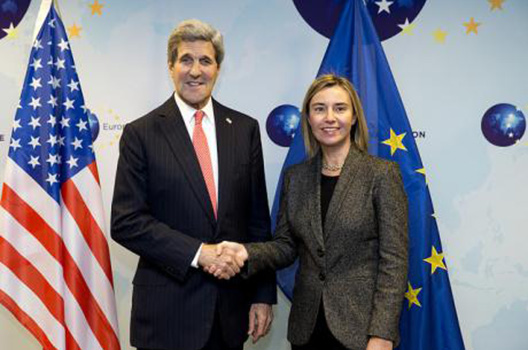 It should come as no surprise that during talks between US Secretary of State John Kerry and EU Foreign Affairs Chief Federica Mogherini last week, Mogherini called for the inclusion of a specific energy chapter in the proposed Transatlantic Trade and Investment Partnership (TTIP) agreement.
It should come as no surprise that during talks between US Secretary of State John Kerry and EU Foreign Affairs Chief Federica Mogherini last week, Mogherini called for the inclusion of a specific energy chapter in the proposed Transatlantic Trade and Investment Partnership (TTIP) agreement.
After all, within the context of gas shortages caused by the Ukrainian conflict and the increasing instability of global energy markets, TTIP could be a potentially vital tool for promoting transatlantic energy security.
In particular, there are hopes that TTIP will benefit Europe through the import of American Liquefied Natural Gas (LNG). Under US law, it is only possible for US gas supplies to be exported to countries it has free trade agreements with. Provided US oil and gas export restrictions are lifted, North American LNG exports would be a welcome supply that Europe has long called for as a counterweight to Russian gas.
It would also grant Europe greater leverage in energy negotiations with Russia, diversify Europe’s energy supply, and help it to begin weaning off its Russian gas addiction. Moreover, it would enable Washington to send a clear signal about its commitment to freeing global energy markets from the influence of any nation that might use them to further political goals.
But serious questions have also been raised about the possible negative implications of TTIP from both an energy and environmental perspective.
For example, the cost of producing LNG is higher in the USA than gas production in Russia, raising questions about the economic competitiveness of imported US shale gas to Europe. But one of the effects of OPEC’s reluctance to curb its recent oversupply of oil has been to force shale companies to become much more cost-efficient. Low oil prices will ironically weed out the weaker players in the fracking industry and force the industry as a whole to find more technically innovative and cost-effective ways of producing shale, something that is happening already.
There are also criticisms about how US natural gas exports under TTIP could stretch production capacity in the US, raising domestic gas prices. However, according to the US Energy Information Administration (EIA), the US is producing more shale gas then it is using and is well on course to becoming a net gas exporter before 2020. And while there will no doubt be shale company closures due to the ongoing price war with OPEC and a consequent lack of industry investment, both factors resulting in a dip in production, there will be an inevitable rebound in oil prices. And once that happens, there is no reason to believe a more efficient and commercially viable shale industry will not continue exploration and extraction from where it had previously left off.
Others fear the negative environmental impact of natural gas that could become worse under a TTIP agreement should production and transportation be increased to serve a European market. But the US Department of Energy has certified that natural gas exports will reduce global greenhouse-gas emissions as LNG replaces coal. As such, natural gas can play a pivotal transitional role as a bridge fuel to cleaner renewable energies.
Indeed the renewable energy sector is itself one TTIP could support. After all, recent historic commitments by the US, China, and EU to reduce greenhouse gas emissions signals more than just a desire to address climate concerns; it signals to energy investors a hitherto unseen confidence in cleaner renewable energies. For EU and US climate goals to be met in coming years, we will need not just a bridge fuel in natural gas, but a genuine push towards a stronger renewable energy sector. And having a TTIP agreement in place will allow the renewable energy industries across both sides of the Atlantic to collaborate, trade, and grow far more effectively than without it.
Of course, there must be safeguards in place to ensure the agreement does not lead to a downward harmonisation of environmental standards, something the EU’s negotiation mandate reiterates it is committed to preventing. And as the European Commission publicly stated, “making our regulations more compatible does not mean going for the lowest common denominator, but rather seeing where we diverge unnecessarily.” The recent pledge by European Chief TTIP Negotiator Ignacio Garcia-Bercero ensuring the agreement will not lead to a change in the EU’s food safety legislation is an example of this ethos in practice.
With the necessary safeguards in place, TTIP can prove to be an invaluable mechanism not just for transatlantic energy relations, but to also help shift energy’s center of gravity toward the Atlantic Basin and away from the ‘Great Crescent’ – the traditional energy-exporting world of Central Asia, the Middle East and Russia. TTIP, as the largest free trade agreement in the world has the ability to draw other major economies that would rather not be excluded from its economic benefits to the negotiating table of global economic governance and energy and environmental standards. With a better public understanding of the major potential benefits TTIP offers and the right political will, it should become a reality.
About the author
Vicente Lopez-Ibor Mayor is former commissioner of the National Energy Commission of Spain. He is chair of one of Europe’s largest solar energy power companies, Lightsource Renewable Energy Ltd. Vicente is also member of the Eminent Persons Group on the “Atlantic Basin Initiative” of the Transatlantic Initiative of the Johns Hopkins University and president of the Spanish-North American Association, VIA-Jefferson Circle of Spain. He has previously written for the Financial Times UK and Bloomberg, amongst others, and is author of the book “Energy & Society.”
Image: (Photo: Wikicommons)

